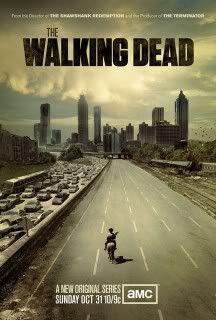
I really feel sorry for you if you haven't bothered to check out the new AMC series, The Walking Dead. Not only is it absolutely terrifying, but it is also one of the most brilliantly written television shows I have had the pleasure to watch in quite a while.
This comes from a person who has all but given up on television thanks to the plague of reality television.
Heh. An apt analogy given the topic of discussion.. Anyway.
Thanks to the masterful storyline of AMC's newest masterpiece, the politics of the zombie are once again en vogue and the zombie once again takes its rightful place in the hallowed halls of proper scholarly discussion.
Don't laugh. I'm being serious!
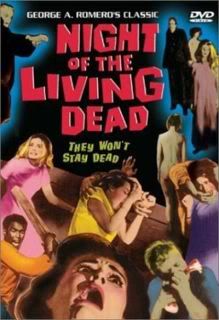
This comes from a person who has all but given up on television thanks to the plague of reality television.
Heh. An apt analogy given the topic of discussion.. Anyway.
Thanks to the masterful storyline of AMC's newest masterpiece, the politics of the zombie are once again en vogue and the zombie once again takes its rightful place in the hallowed halls of proper scholarly discussion.
Don't laugh. I'm being serious!

In 1968, audiences were treated to what is undeniably one of the most influential horror films of all times; George Romero's Night of the Living Dead. Reviews were mixed, but it is my opinion that too many journalists focused too much on what was there on the screen rather than what the images on the screen were supposed to represent.
To put it bluntly, George Romero is the horror genre's own Mark Twain and Night of the Living Dead isn't so much about zombies as it is a scathing indictment of society at large.
In order to understand the basis of Romero's critique, you have to ask yourself one important question: What is it about zombies that scares the hell out of you?
Let's examine what makes zombies tick... so to speak....
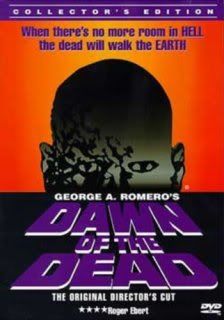
To put it bluntly, George Romero is the horror genre's own Mark Twain and Night of the Living Dead isn't so much about zombies as it is a scathing indictment of society at large.
In order to understand the basis of Romero's critique, you have to ask yourself one important question: What is it about zombies that scares the hell out of you?
Let's examine what makes zombies tick... so to speak....

Zombies are mindless creatures that only act in unison when they are attacking the living. Any connection to the identity they possessed while they were alive is long since forgotten in the haze of an undead quasi-consciousness.
Zombies represent the very worst incarnation of social conformity as well as the complete destruction of individualism and self-determination. The people in life who you once loved or respected are replaced with rotting shells whose single motivation is the overwhelming need to eat you alive.
After you die (provided that there is enough of you left to re-animate), you will rise up and join them in their task until every last living person is wiped off of the face of the earth.
The [REC] films put an interesting spin on this idea. Over the course of the movies, the audience eventually discovers that the zombies are not so much zombies in the traditional Romero sense as they are terrestrial extensions of a malevolent supernatural force.
Being "dead" in the [REC] movies not only means that you lose your free will; it also means that you lose your immortal soul.
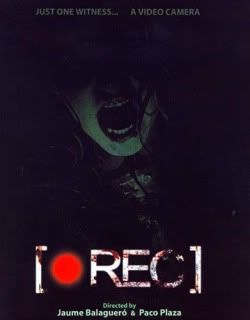
Zombies represent the very worst incarnation of social conformity as well as the complete destruction of individualism and self-determination. The people in life who you once loved or respected are replaced with rotting shells whose single motivation is the overwhelming need to eat you alive.
After you die (provided that there is enough of you left to re-animate), you will rise up and join them in their task until every last living person is wiped off of the face of the earth.
The [REC] films put an interesting spin on this idea. Over the course of the movies, the audience eventually discovers that the zombies are not so much zombies in the traditional Romero sense as they are terrestrial extensions of a malevolent supernatural force.
Being "dead" in the [REC] movies not only means that you lose your free will; it also means that you lose your immortal soul.

Secondly, the zombie's hunger for human flesh and brain matter is a staple of horror cinema lore, but the dead cannot digest what they ingest.
Zombies don't eat because they are hungry; they eat for the sake of eating. Furthermore, unless zombies are in pursuit of a meal, they are content to meander about in the well documented shambling gait.
In short, zombies are the epitome of two of the Seven Deadly Sins; those being Sloth and Gluttony. It is no accident that Romero chose the zombie as the vehicle to criticize American society about its wanton fascination with consumerism.
Society's need to "have" is just as destructive to the body politic as the zombie's need to "eat." Neither impulse is driven by natural behavior and the satisfaction of that impulse usually takes a decidedly violent form.
If humans don't get what they want, they take it...
So do zombies... and both parties do this without consideration for supply.
Whether it be brains, cheeseburgers, or crude oil, the primary preoccupation of both human and zombie societies appears to be not only to take until there is nothing left; it is also to take without leaving something of value in return.
Whomever dies with the most toys wins and whomever is undead and eats the most brains wins.... sort of...
Romero's shopworn criticism of rampant consumerism is further coupled with a scalding critique of materialism and suburban flight in the 1978 sequel, Dawn of the Dead.
There is a specific reason why the primary set piece of this film is a shopping mall. Poor Zack Snyder did not figure that part out in his 2004 remake. Next time you watch the remake, listen very closely and you just may catch the sound of the "whoosh" of the principles of the first film sailing over his head.
Despite the ever present hordes of brain-sucking shufflers, the zombie itself is only part of the zombie film equation.
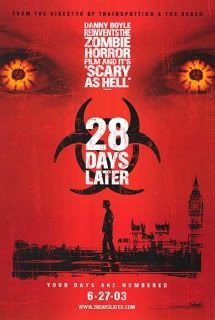
Zombies don't eat because they are hungry; they eat for the sake of eating. Furthermore, unless zombies are in pursuit of a meal, they are content to meander about in the well documented shambling gait.
In short, zombies are the epitome of two of the Seven Deadly Sins; those being Sloth and Gluttony. It is no accident that Romero chose the zombie as the vehicle to criticize American society about its wanton fascination with consumerism.
Society's need to "have" is just as destructive to the body politic as the zombie's need to "eat." Neither impulse is driven by natural behavior and the satisfaction of that impulse usually takes a decidedly violent form.
If humans don't get what they want, they take it...
So do zombies... and both parties do this without consideration for supply.
Whether it be brains, cheeseburgers, or crude oil, the primary preoccupation of both human and zombie societies appears to be not only to take until there is nothing left; it is also to take without leaving something of value in return.
Whomever dies with the most toys wins and whomever is undead and eats the most brains wins.... sort of...
Romero's shopworn criticism of rampant consumerism is further coupled with a scalding critique of materialism and suburban flight in the 1978 sequel, Dawn of the Dead.
There is a specific reason why the primary set piece of this film is a shopping mall. Poor Zack Snyder did not figure that part out in his 2004 remake. Next time you watch the remake, listen very closely and you just may catch the sound of the "whoosh" of the principles of the first film sailing over his head.
Despite the ever present hordes of brain-sucking shufflers, the zombie itself is only part of the zombie film equation.

Zombies in zombie movies tend to be little more than set pieces and their menace usually serves only to speed up the pacing. It's not a zombie movie unless there are at least two or three good chase scenes.
And before you ask the question, my answer is "no." Zombies are not supposed to run.
The sensation of dread you feel during zombie movie chases comes from the awful realization that you are outnumbered.
Zombies don't have to chase after you because there is nowhere for you to hide. Their numbers will infest every nook and cranny in the world. The world doesn't belong to you anymore; it belongs to the shamblers and eventually they will find you.
They won't discover where you are because they are actively looking for you. They will find you simply because there will be no place on earth where they will not be present, and they will always be on the hunt because they will never rest.
Consequently, if you are a zombie at the time when the zombie apocalypse goes down, then your worries are usually over. The real story of any good zombie movie deals with how the death and undeath of civilization affects the survivors.
The tragic conclusion of Night of the Living Dead is nigh-legendary in the halls of horror cinema. The brave African American protagonist, Ben (Duane Jones), manages to survive the zombie onslaught only to be mistaken for a ghoul by a posse of rednecks, shot dead, and subsequently thrown onto a burning pyre.
In Dawn of the Dead, a biker gang shows up to the shopping mall to loot the stores and manages to become just as big of a menace to the survivors inside the mall as the zombies lurking outside.
28 Days Later (Come on now. It's a zombie movie when you think about it...) showcases a unit of psychotic British soldiers determined not only to outlast the infected hordes, but they also intend to repopulate the UK via a system of female sexual servitude.
Even, the survivors of the Day After in The Walking Dead painfully begin to realize that zombies are just another ornament on the Tree of Woe, as the series (in the true Romero-style edutainment spirit) tackles every socio-political hot button issue from racism (just like Night of the Living Dead did!) to spousal abuse.
Whether living or dead, the human monster is the most dangerous one of all.
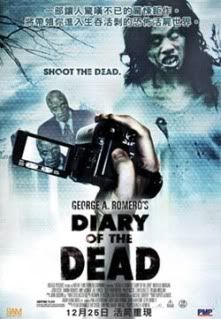
And before you ask the question, my answer is "no." Zombies are not supposed to run.
The sensation of dread you feel during zombie movie chases comes from the awful realization that you are outnumbered.
Zombies don't have to chase after you because there is nowhere for you to hide. Their numbers will infest every nook and cranny in the world. The world doesn't belong to you anymore; it belongs to the shamblers and eventually they will find you.
They won't discover where you are because they are actively looking for you. They will find you simply because there will be no place on earth where they will not be present, and they will always be on the hunt because they will never rest.
Consequently, if you are a zombie at the time when the zombie apocalypse goes down, then your worries are usually over. The real story of any good zombie movie deals with how the death and undeath of civilization affects the survivors.
The tragic conclusion of Night of the Living Dead is nigh-legendary in the halls of horror cinema. The brave African American protagonist, Ben (Duane Jones), manages to survive the zombie onslaught only to be mistaken for a ghoul by a posse of rednecks, shot dead, and subsequently thrown onto a burning pyre.
In Dawn of the Dead, a biker gang shows up to the shopping mall to loot the stores and manages to become just as big of a menace to the survivors inside the mall as the zombies lurking outside.
28 Days Later (Come on now. It's a zombie movie when you think about it...) showcases a unit of psychotic British soldiers determined not only to outlast the infected hordes, but they also intend to repopulate the UK via a system of female sexual servitude.
Even, the survivors of the Day After in The Walking Dead painfully begin to realize that zombies are just another ornament on the Tree of Woe, as the series (in the true Romero-style edutainment spirit) tackles every socio-political hot button issue from racism (just like Night of the Living Dead did!) to spousal abuse.
Whether living or dead, the human monster is the most dangerous one of all.

I personally am very happy to see the return of the zombie film to its traditional role of catalyst for social commentary.
The discussions that these films generate, tragically enough, are timeless debates because the social inequalities that they address are as present as they ever were, and we should have these discussions while we still have time.
The cautionary moral of the zombie fable is that one morning when we least expect it, the last grain of sand in mankind's hourglass will fall and social divides will no longer be defined by have and have-not.
On one side, there will be the quick and on the other side.. there will be the dead..
On that advent of the undead armageddon, all men will find themselves on equal footing... whether they like it or not....
Free at last....
Free at last....
The discussions that these films generate, tragically enough, are timeless debates because the social inequalities that they address are as present as they ever were, and we should have these discussions while we still have time.
The cautionary moral of the zombie fable is that one morning when we least expect it, the last grain of sand in mankind's hourglass will fall and social divides will no longer be defined by have and have-not.
On one side, there will be the quick and on the other side.. there will be the dead..
On that advent of the undead armageddon, all men will find themselves on equal footing... whether they like it or not....
Free at last....
Free at last....










3 comments:
zombies rule.. that is it!
:)
iZombie
I'm with iZombie. Zombies do, indeed, rule. And so does this post! I included a link to it in the second "issue" of Spatter Analysis.
Check it out!
--J/Metro
Thanks, you guys.
I'm honored to be in such wonderful company in the November edition of Spatter Analysis.
I think we do really good work here at MovieFeast and I am looking forward to more of our stuff showing up at SA!
Post a Comment